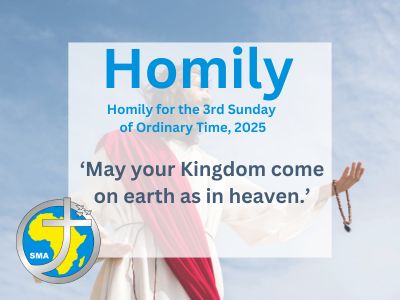Theme: May your Kingdom come on earth as in heaven.
Readings Nehemiah 8: 2-4a, 5-6, 8-10; 1 Corinthians 12:12-30; Luke 1 : 1-4; 4:14-21
There are notable parallels as well as contrasts between the first reading and the gospel. In the first reading from the Book of Nehemiah, the priest Ezra solemnly reads a lengthy section from the Book of the Law to a large gathering of Israelites. He thus re-constitutes them as ‘God’s holy people’ following the traumatic years of exile in Babylon. We are told that the people listened attentively and wept as they heard God’s word proclaimed to them. We might ask ourselves: How attentively do we listen to God’s word and does it ever touch our hearts and move us to tears?
In the Gospel from Luke, Jesus also proclaims God’s word to those gathered in the Synagogue of his home town of Nazareth. The passage he reads is taken from the Isaiah, one of the great prophets of Israel: ‘The Spirit of the Lord is upon me, for he has anointed me to bring good news to the afflicted. He has sent me to proclaim liberty to captives, sight to the blind, to let the oppressed go free, to proclaim a year of favour from the Lord (Lk 4:18-19). Jesus then sits down, and, in words that launch his great mission of liberation, he says: ‘This text is being fulfilled today even as you listen’ (Lk 4:21). The words of Isaiah serve as Jesus’ manifesto. He has come to replace the old Jewish love of law with a new law of love and inaugurate the greatest revolution in human history.
Jesus’ mission leads him to challenge head-on the values of Palestinian theocratic society. The afflictions of the poor, then as now, were, in large measure, caused by repression, discrimination and exploitation by the rich and powerful, the upholders of the status quo. Jesus directs his mission to those who had been ignored or pushed aside: to the sick, segregated on cultic grounds; to tax-collectors, excluded on political and religious grounds; and to prostitutes and public sinners, despised and rejected on moral grounds. In his compassionate outreach to these outcasts, Jesus embodies God’s kingly rule. This is good news for them as it means the end of their misery and the introduction of a new order of social relationships that includes them. Indeed, for Jesus no one is excluded from the love of God ‘who causes his sun to rise on bad people as well as good, and sends rain to fall on the upright and the wicked alike’ (Mt 5:45).
Some theologians have argued that Jesus did not have a social or political agenda, that he wanted to change hearts not social structures. However, as the noted Scripture scholar, Tom Wright, points out, in the Judaism of Jesus’ day religion and politics were inseparable. As his contemporaries would have expected, Jesus sought to bring God’s kingly rule to bear on every aspect of human life. In the ‘Our Father’ he taught his disciples to pray: ‘Thy Kingdom come. Thy will be done on earth as it is in heaven’ (Mt 6:10). The Kingdom proclaimed and enacted by Jesus was not merely the personal reign of God’s spirit in the souls of individuals. Jesus was launching a spiritual and social revolution that would turn Israel and the world up-side-down. He wanted to establish God’s reign of justice, peace, truth and love in Israel and (through Israel) among all peoples.
Jesus lived, died and rose again in order to establish God’s loving rule on earth, and the task of his disciples is to continue that work. In the words of Pope Francis, the mission of the Church is ‘to proclaim and establish among all peoples the kingdom of Christ and of God’. This mission entails the integral transformation of the world in which we live. In the words of Cardinal Suenans: ‘The preaching of the Gospel and its acceptance imply a social revolution whereby the hungry are fed and justice becomes the right of all’.
But we do not carry out this mission as isolated individuals. As our Second Reading from St Paul’s First Letter to the Corinthians reminds us, we are the Body of Christ, and it is as the Body of Christ that we continue Jesus’ mission. The different gifts received by the members of the Church from the Holy Spirit complement one another, and, when properly used, build up the unity of the Church and serve its mission. The synodal process, launched by Pope Francis over three years ago, and which must be continued, provides us with a graced opportunity to deepen our sense of being the Body of Christ, and to collaborate more effectively with one another in the service of the Church’s mission. It is only when the Church really functions as the Body of Christ – when all its members are truly open to the divine Spirit and to one another – that it becomes a credible sign and instrument of God’s reign of love and justice. So we pray: ‘Lord, make us instruments of your peace, justice and love in our deeply divided and wounded world.’
Listen to audio version:

